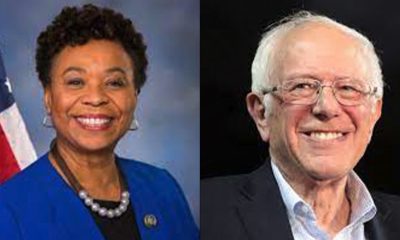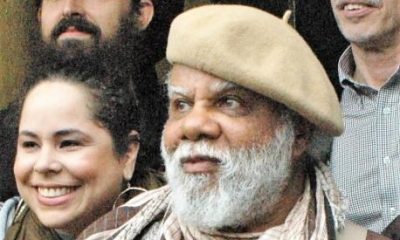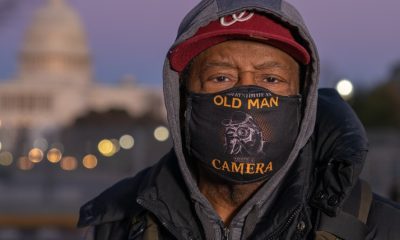Politics
Will Americans Vote for a Democratic Socialist?

In this photo taken May 20, 2015, Democratic Presidential candidate Sen. Bernie Sanders, I-Vt., poses for a portrait before an interview with The Associated Press in Washington. (AP Photo/Jacquelyn Martin)
Lawrence Wittner, Time Magazine via HISTORY NEWS NETWORK
WASHINGTON (TIME) — The recent announcement by U.S. Senator Bernie Sanders, an avowed “democratic socialist,” that he is running for the Democratic nomination for President raises the question of whether Americans will vote for a candidate with that political orientation.
During the first two decades of the twentieth century, the idea of democratic socialism — democratic control of the economy — had substantial popularity in the United States. At the time, the Socialist Party of America was a thriving, rapidly-growing political organization, much like its democratic socialist counterparts abroad — the British Labour Party, the French Socialist Party, the German Social Democratic Party, the Australian Labor Party, and numerous other rising, working class-based political entities around the world. In 1912, when the United States had a much smaller population than today, the Socialist Party had 118,000 dues-paying members and drew nearly a million votes for its candidate, Eugene V. Debs, the great labor leader, for President. (The victor that year was the Democratic candidate, Woodrow Wilson, who drew six million votes.) Furthermore, the party held 1,200 public offices in 340 cities, including 79 mayors in 24 states. Socialist administrations were elected in Minneapolis, Minnesota, Butte, Montana, Flint, Michigan, Schenectady, New York, and all across the country. In 1912, the Socialist Party claimed 323 English and foreign language publications with a total circulation in excess of two million.
Of course, this socialist surge didn’t last. The Democratic and the Republican parties, faced with this threat to their political future, turned to supporting progressive agendas — breaking up or regulating giant corporations, curbing corporate abuses, and championing a graduated income tax — that stole the socialists’ thunder. In addition, after U.S. entry into World War I, an action opposed by the socialists, the federal and state governments moved to crush the Socialist Party — arresting and imprisoning its leaders (including Debs), purging its elected officials, and closing down its publications. Moreover, one portion of the party, excited by the success of revolutionaries in overthrowing Russia’s Czar and establishing the Soviet Union, broke with the Socialist Party and established Communist rivals. Co-opted by the mainstream parties, repressed by government, and abandoned by would-be revolutionaries, the Socialist Party never recovered.
###
Community
AG Bonta Says Oakland School Leaders Should Comply with State Laws to Avoid ‘Disparate Harm’ When Closing or Merging Schools
California Attorney General Rob Bonta sent a letter this week to the Oakland Unified School District (OUSD) Board of Education saying the district has a duty to comply with state education and civil rights laws to protect students and families from “disparate harm,” such as segregation and discrimination, if the district goes ahead with school closures, mergers or consolidations in 2025-2026.
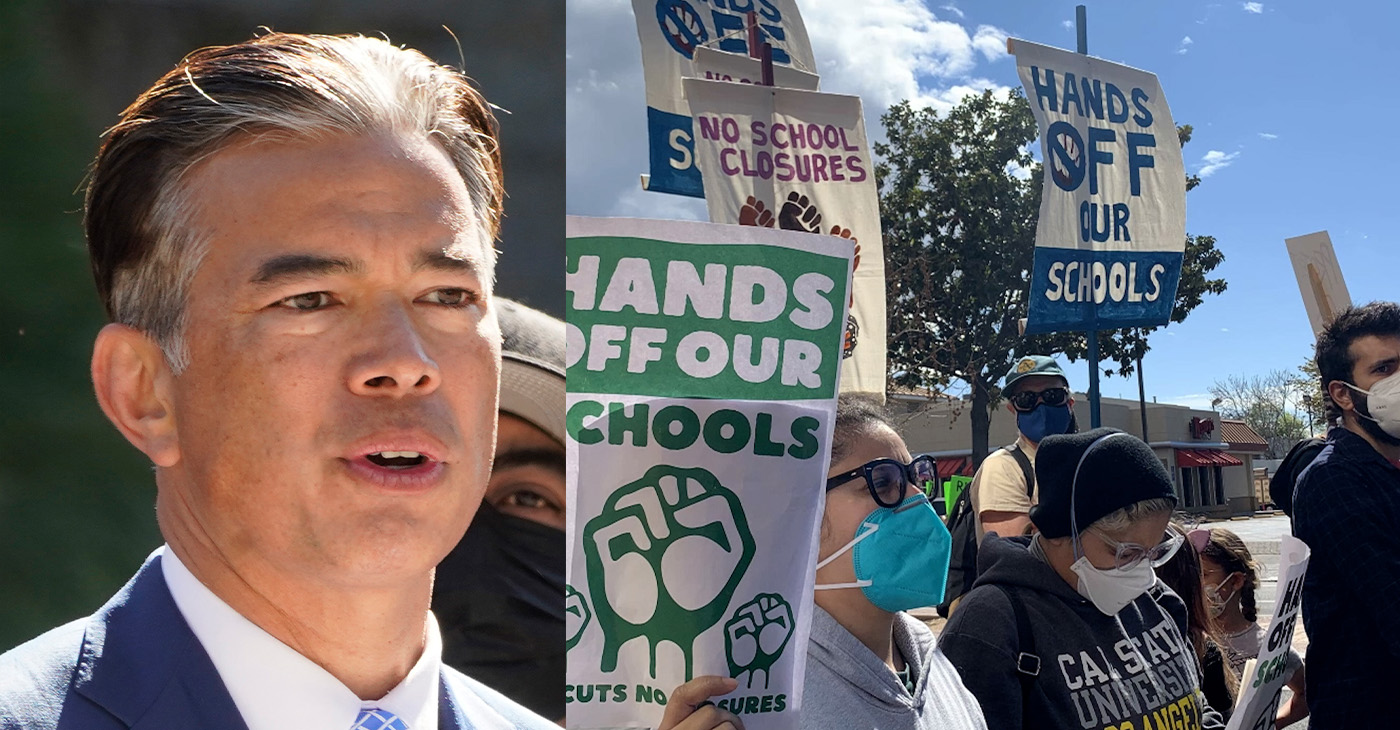
AG Bonta said DOJ investigation of 2022 closure decisions would have negatively impacted Black and low-income families.
By Post Staff
California Attorney General Rob Bonta sent a letter this week to the Oakland Unified School District (OUSD) Board of Education saying the district has a duty to comply with state education and civil rights laws to protect students and families from “disparate harm,” such as segregation and discrimination, if the district goes ahead with school closures, mergers or consolidations in 2025-2026.
The letter and an accompanying media release announced the findings of the California Department of Justice’s (DOJ) investigation into the OUSD Board’s Feb. 8, 2022, decision to close Parker Elementary, Brookfield Elementary, Carl B. Munck Elementary, Fred T. Korematsu Discovery Academy, Grass Valley Elementary, Horace Mann Elementary, and Community Day School and eliminate grades 6-8 of Hillcrest Elementary and La Escuelita Elementary.
“All school districts and their leadership have a legal obligation to protect vulnerable children and their communities from disparate harm when making school closure decisions,” said Attorney General Bonta.
“The bottom line is that discrimination in any form will not be tolerated,” he said. “I am committed to working with OUSD’s leadership to achieve successful outcomes for students.
“My office will continue to monitor OUSD’s processes and decision-making as it moves forward with the required community engagement, equity impact analysis, and planning to implement any future closures, mergers, or consolidations” to ensure compliance with California’s Constitution, AB 1912, and anti-discrimination laws.
By press time, the school district did not respond to a request for comment from OUSD.
The DOJ’s findings showed that the February 2022 decision, later partially rescinded, would have disproportionately impacted Black and low-income elementary students, as well as high-need students with disabilities, according to the media release.
The Attorney General outlined concerns about criteria OUSD has announced that it may rely on to determine future closures, mergers, and consolidations and provided recommendations to ensure OUSD does not violate state law, including prohibitions against closure decisions that reinforce school segregation or disproportionately impact any student group as required by the State Constitution, AB 1912, and anti-discrimination laws.
According to AB 1912, passed in September 2022, financially distressed school districts contemplating school closures, mergers, or consolidations must engage the community before closing schools; conduct an equity impact assessment; and provide the public with the set of criteria the district plans to utilize to make decisions.
In the letter, DOJ identified a “problematic” approach to planning for closing schools in 2025-2026 and “strongly recommends” steps OUSD should take going forward.
- “Take affirmative steps to ensure that its enrollment and attendance boundary and school closure decisions alleviate school segregation and do not create disproportionate transportation burdens for protected subgroups.”
- Don’t solely utilize criteria such as school facilities’ conditions, school operating costs, and school capacity without also including an assessment of past and present inequities in resources “due to educational segregation or other causes.”
- Some of OUSD’s proposed guidelines “may improperly penalize schools serving students with disabilities and students who have high needs.”
- The district’s decisions should also include “environmental factors, student demographics and feeder attendance patterns, transportation needs, and special programs.”
- Avoid overreliance on test scores and other quantitative data without also looking at “how each school is serving the needs of its specific student body, especially as it relates to historically marginalized communities.”
- “Engage an independent expert to facilitate community input and equity impact.”
The letter also emphasized that DOJ is willing to provide “feedback and consultation at any time during the process to ensure that OUSD’s process and outcomes are legally compliant and serve the best interests of the school community and all of its students.”
Community
Attorney General Rob Bonta, Oakland Lawmakers, Introduce Legislation to Protect Youth Online
At a press conference in downtown Oakland on Jan. 29, Attorney General Rob Bonta joined Sen. Nancy Skinner (D-Berkeley) and Assemblymember Buffy Wicks (D-Oakland) to announce two pieces of legislation designed to protect children online. The bills are Senate Bill (SB) 976, the Protecting Youth from Social Media Addiction Act and Assembly Bill (AB) 1949, the California Children’s Data Privacy Act.
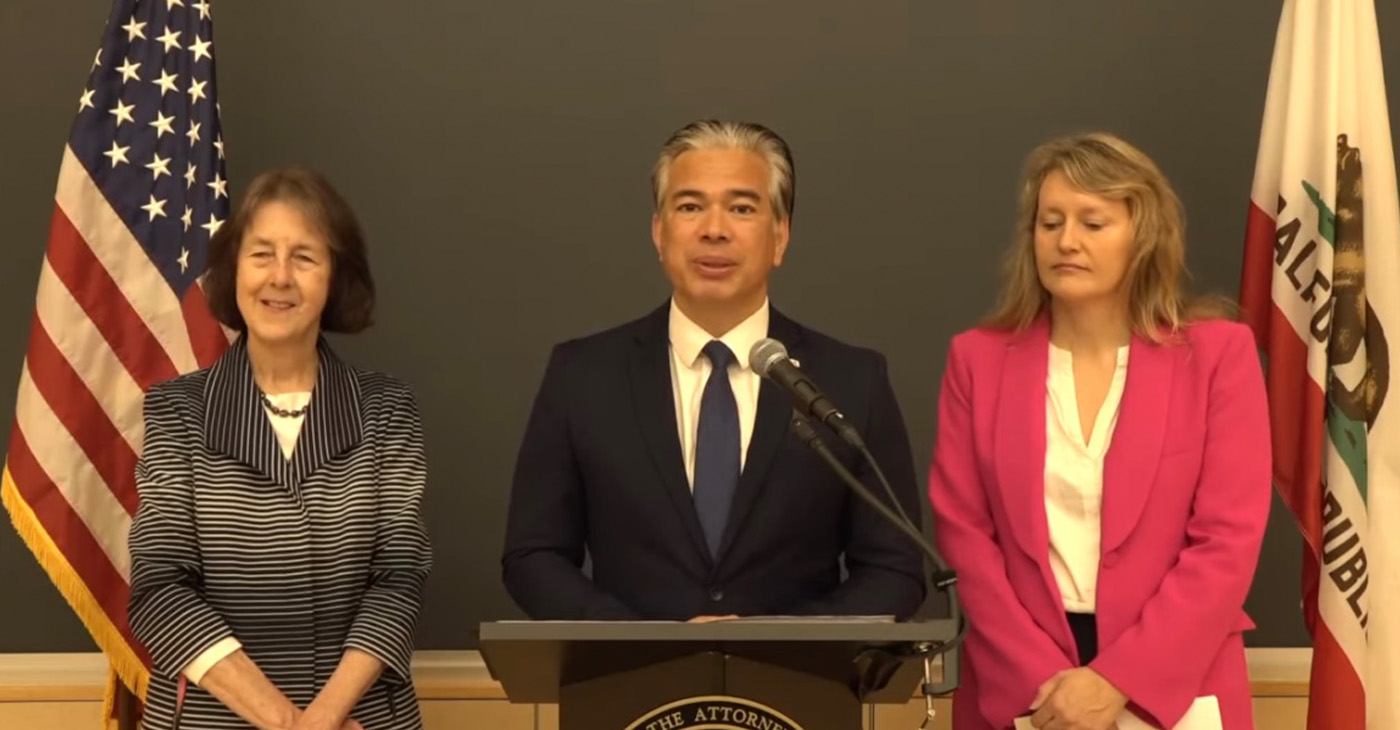
By Magaly Muñoz
At a press conference in downtown Oakland on Jan. 29, Attorney General Rob Bonta joined Sen. Nancy Skinner (D-Berkeley) and Assemblymember Buffy Wicks (D-Oakland) to announce two pieces of legislation designed to protect children online.
The bills are Senate Bill (SB) 976, the Protecting Youth from Social Media Addiction Act and Assembly Bill (AB) 1949, the California Children’s Data Privacy Act.
Skinner authored SB 976, which addresses online addiction affecting teenage users, while Wicks’s bill, AB 1949, takes on big tech by proposing data privacy and children rights protections.
“Social media companies unfortunately show us time and time again that they are all too willing to ignore the detriment to our children, the pain to our children, the mental health and physical challenges they face, in order to pursue profits,” Bonta said.
SB 976 would allow parents to control the nature and frequency of the content their under-18-year-old children see on social media. Notifications from social media platforms would also be paused from midnight to 6 am and controls would allow parents to set time limits on their children’s usage based on their discretion.
Skinner stated that the longer that kids are on their phones during the day, the higher the risk for depression, anxiety and other related issues.
The bill would also push to get rid of addictive media that is harmful for young women and girls, specifically image filters that mimic cosmetic plastic surgery.
Bonta and 33 other attorney generals had previously filed a lawsuit against Meta, owner of the popular social media applications Instagram and Facebook. The filing claims that the company purposefully uses algorithmized content that harms younger audiences.
“Social media companies have the ability to protect our kids, they could act, but they do not,” Skinner said.
The Child Data Privacy Act would strengthen existing protections for data privacy under the California Consumer Privacy Act (CCPA). The lawmakers argue that the law does not have effective protection for those under 18 years old.
Wicks stated that the bill would forbid businesses from collecting, using, sharing, or selling personal data of anyone underage unless they receive informed consent, or it becomes necessary for the purpose of the business.
Wicks added that the acts would make it so that a search on the internet like “How do I lose weight?” would not result in dieting pill advertisements targeting youth, which, some experts report, could be harmful to their mental and physical health.
“In a digital age where the vulnerabilities of young users are continually exploited, we cannot afford to let our laws lag behind, our children deserve complete assurance that their online experience will be safeguarded from invasive practices,” Wicks said.
Supporters of the two acts say they have gained bipartisan support issue, but the authors and Bonta expect them to be met with pushback from the affected companies.
Business
V.P. Kamala Harris: Americans With Criminal Records Will Soon Be Eligible for SBA Loans
Speaking in Las Vegas on Jan. 27, Vice President Kamala Harris announced a forthcoming federal rule that will extend access to Small Business Administration (SBA) loans to Americans who have been convicted of felonies but have served their time. Small business owners typically apply for the SBA loans to start or sustain their businesses.
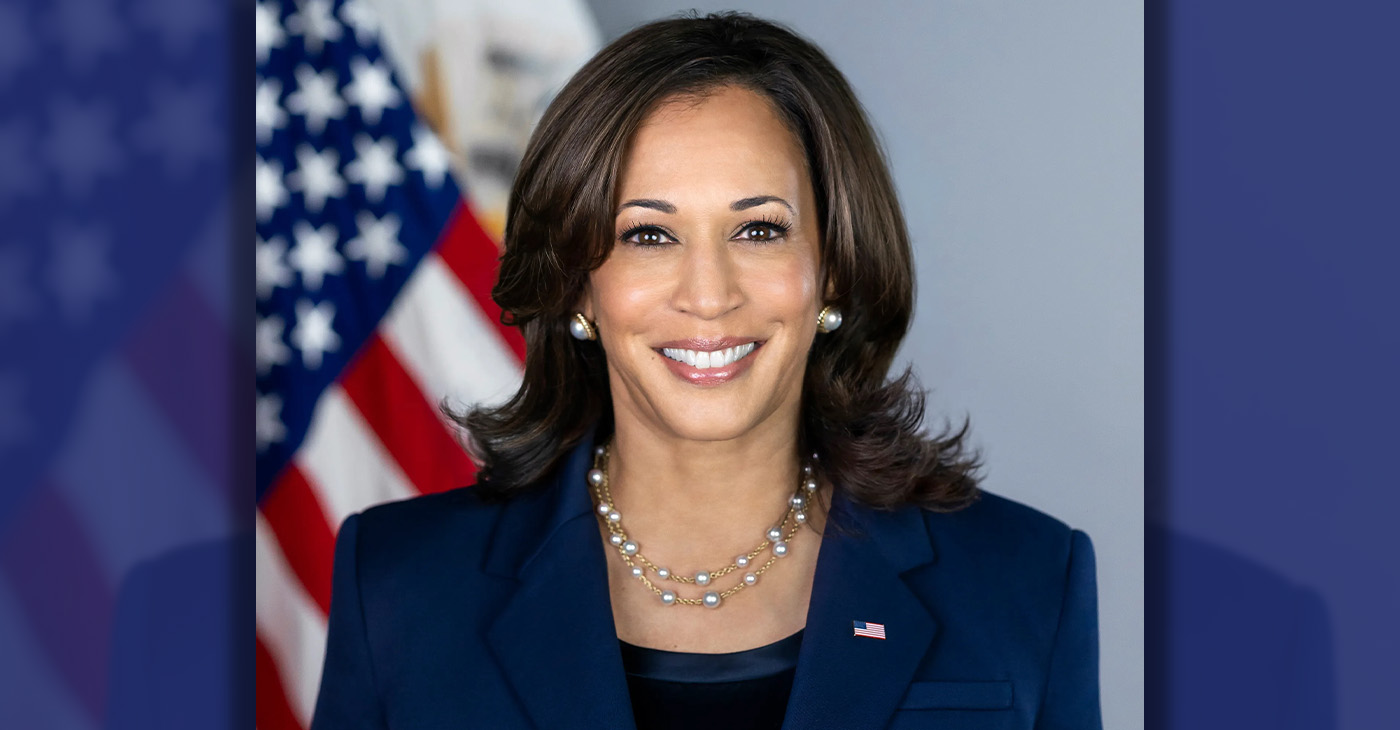
By California Black Media
Speaking in Las Vegas on Jan. 27, Vice President Kamala Harris announced a forthcoming federal rule that will extend access to Small Business Administration (SBA) loans to Americans who have been convicted of felonies but have served their time.
Small business owners typically apply for the SBA loans to start or sustain their businesses.
Harris thanked U.S. Rep. Steven Horsford (D-NV-04), the chair of the Congressional Black Caucus, for the work he has done in Washington to support small businesses and to invest in people.
“He and I spent some time this afternoon with business leaders and small business leaders here in Nevada. The work you have been doing to invest in community and to invest in the ambition and natural capacity of communities has been exceptional,” Harris said, speaking to a crowd of a few hundred people at the Brotherhood of Electrical Workers Hall in East Las Vegas.
On her daylong trip, Harris was joined by Horford, SBA Administrator Isabella Guzman, Interim Under Secretary of Commerce for Minority Business Development Agency (MBDA) Eric Morrissette, and Sen. Catherine Cortez Masto (D-Nev).
“Formerly incarcerated individuals face significant barriers to economic opportunity once they leave prison and return to the community, with an unemployment rate among the population of more than 27%,” the White House press release continued. “Today’s announcement builds on the Vice President’s work to increase access to capital. Research finds that entrepreneurship can reduce recidivism for unemployed formerly incarcerated individuals by as much as 30%.”
-

 Activism4 weeks ago
Activism4 weeks agoOakland Post: Week of March 20 – 26, 2024
-

 #NNPA BlackPress3 weeks ago
#NNPA BlackPress3 weeks agoMayor, City Council President React to May 31 Closing of Birmingham-Southern College
-

 #NNPA BlackPress3 weeks ago
#NNPA BlackPress3 weeks agoCOMMENTARY: D.C. Crime Bill Fails to Address Root Causes of Violence and Incarceration
-

 #NNPA BlackPress3 weeks ago
#NNPA BlackPress3 weeks agoFrom Raids to Revelations: The Dark Turn in Sean ‘Diddy’ Combs’ Saga
-

 #NNPA BlackPress3 weeks ago
#NNPA BlackPress3 weeks agoCOMMENTARY: Lady Day and The Lights!
-

 #NNPA BlackPress3 weeks ago
#NNPA BlackPress3 weeks agoBaltimore Key Bridge Catastrophe: A City’s Heartbreak and a Nation’s Alarm
-

 #NNPA BlackPress3 weeks ago
#NNPA BlackPress3 weeks agoBaltimore’s Key Bridge Struck by Ship, Collapses into Water
-

 Activism3 weeks ago
Activism3 weeks agoOakland Post: Week of March 27 – April 2, 2024



